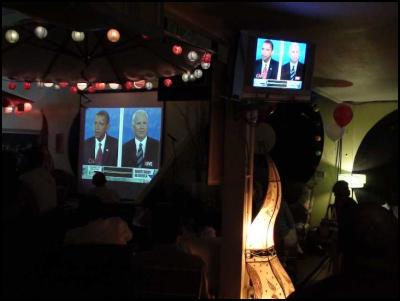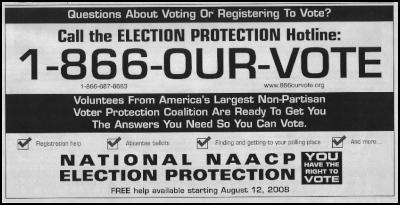An Occasional Note on the Campaigns No. 16
An Occasional Note on the Campaigns No. 16
In just 16 days I will be the most important person in the world—a voter in the 2008 U.S. presidential election. Okay, okay. I’ll be just one of those voters. And it’s debatable whether the U.S. is the most important country in the world, but when you live here the idea of U.S. supremacy is relentlessly hammered home all the time via the education system, legislative and executive avenues, and the media, so please pardon my hyperbole.
But given that I’m full of my own self-importance this lovely, crisp, sunny Sunday morning in Northern California, here’s a few thoughts on how I’m preparing to discharge this important responsibility of being a voter.
::Debates::
I’m not entirely sure that I took
anything actionable away from watching the televised debates
put on by the Presidential Election Commission. In fact, I
didn’t see the first one and saw only the beginning of the
final one this past Thursday night, checking out an Obama
fundraising debate watch party in a bar in Oakland on my way
home from work.

Click to enlarge
The good news is that the debates aren’t over! The bad news is that two different organizations were planning to hold debates tonight, and both events ended up being canned. An online event to be streamed via BreakTheMatrix.com for ThirdPartyTicket.com from 7-9 pm was cancelled when the Free and Equal Election Coalition said it had arranged a live debate at Columbia University in New York for the same date at 8 pm.
Then the Columbia event was cancelled due to scheduling difficulties, and a Free and Equal press release states the debate will take place instead in Washington, DC, on Thursday, October 23. I truly hope it eventuates. In the meantime, those of you who are curious about why people in this country persist in wanting to know about the ideas of more than just two people/parties should watch this little Republocrat Campaign Song.
It is not folly to consider the opinions of third party candidates. As these graphical timelines of political parties in the U.S. show, third parties have contributed a great deal to the political discourse in this country.
::Campaign Contributions::
My contribution to
presidential election campaigns is via my tax return form,
where I check the box to donate $3 to the Presidential
Election Campaign Fund. According to the tax return guide,
the fund “reduces candidates’ dependence on large
contributions from individuals and groups and places
candidates on an equal financial footing in the general
election.”
Of course, that’s only if presidential candidates elect to accept public financing of their campaigns, which Obama pledged to do, then reneged on that pledge. McCain—co-author of the McCain Feingold campaign finance reform legislation—kept to that pledge. However, David Donnelly, Director of Campaign Money Watch, issued a press release last week stating that John McCain is now backing away from his commitment to publicly financed elections.
In the press release Donnelly states “it is Barack Obama, not John McCain, who is currently sponsoring bills to fix the presidential public financing system and extend public financing to congressional elections. It is Barack Obama, not John McCain, who signed a pledge to make passage of these bills a priority if elected.” (For a graphical look at what contributions Congress members receive—along with their House and Senate committee assignments—go to maplight.org.)
Campaign financing in the States is an incredibly confusing topic, and public understanding of it is not helped by news items like this one from the local ABC affiliate about Saturday’s visit to the Bay Area by Democratic VP candidate Joe Biden.
The viewer is left with the impression that the $5000-a-plate event was raising money for the candidates on the presidential ticket—which would be over the federal limit of $2300 contribution by any one individual to any one candidate. That limit doesn’t apply to individuals’ contributions to political parties themselves or any of the committees political parties set up to distribute money to the candidates they are backing.
ABC7 usually holds itself to a higher standard. In fact, it has a great resource for local voters, called NextGen Politics, which gives webtime to candidates for local races and the for and against arguments for statewide propositions on the ballot.
::Protecting my
vote::
I signed up to be a poll worker for this election,
and county election officials called to verify my
availability, placing me on the list of backup workers as
they have plenty of volunteers. My main concern in my
precinct is that the poll workers take the ballot from you
and feed it into the optical scan machine, which is placed
so you can’t get near enough to see the audit strip that
shows what it (presumably) recorded.
But even if I’m not a poll worker myself, there are people I can call. Direct-mail targeted by the precinct or zip code that I live in, I received a copy of the Minority News last week, which features this big ad below an article by the California Secretary of State about voting rights. (Pity about the spelling mistake.)

Click to enlarge
The issue of election integrity, especially of electronic voting results, is popping up here and there in the media, most recently this morning on Bob Shieffer’s Sunday morning show on CBS, Face the Nation. He asked Democratic Congresswoman Wasserman-Shultz of Florida if that state was ready for the election. In her reply, she touted Florida’s use of optical scan machines that will provide a paper trail should a recount be necessary.
For news and commentary on election protection issues, you should of course go to Scoop’s clearinghouse on the subject, usacoup.scoop.co.nz. Scoop has doggedly pursued this issue since first breaking the news, back in 2003, of how easily computerized voting systems could be hacked.
--PEACE—


 Binoy Kampmark: Jesting On The Environment - Australian Mining Gets A Present
Binoy Kampmark: Jesting On The Environment - Australian Mining Gets A Present Martin LeFevre - Meditations: The Antithesis Of What Jesus Taught And Lived
Martin LeFevre - Meditations: The Antithesis Of What Jesus Taught And Lived  Ramzy Baroud: The West Bank's Men Of The CIA - Why Is The PA Killing Palestinians In Jenin?
Ramzy Baroud: The West Bank's Men Of The CIA - Why Is The PA Killing Palestinians In Jenin? Binoy Kampmark: Concentrated Markets And Iceless Fokkers
Binoy Kampmark: Concentrated Markets And Iceless Fokkers Binoy Kampmark: Catching Pegasus - Mercenary Spyware And The Liability Of The NSO Group
Binoy Kampmark: Catching Pegasus - Mercenary Spyware And The Liability Of The NSO Group Ramzy Baroud: The World Owes Palestine This Much - Please Stop Censoring Palestinian Voices
Ramzy Baroud: The World Owes Palestine This Much - Please Stop Censoring Palestinian Voices